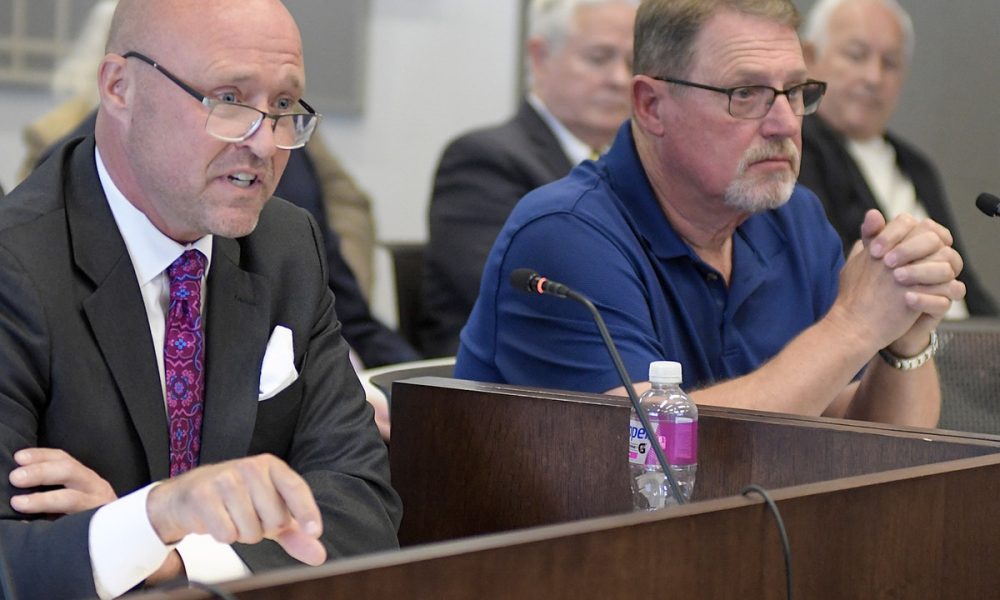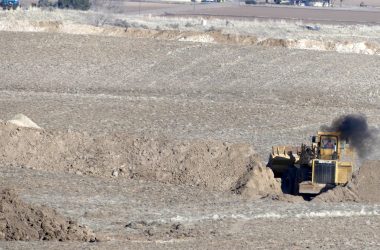
Greg Smith, Malheur County economic development director, makes a point during an Oregon Transportation Commission meeting in June while Larry Wilson, Malheur County commissioner, looks on. On Thursday, July 18, the commission approved a $26 million rail reload project north of Nyssa. (The Enterprise/File).
SALEM – A multimillion-dollar rail reload facility that was on the ropes and nearly down for the count a month ago received a green light from the Oregon Transportation Commission Thursday.
Now Malheur County will move ahead ironing out the fine details of the $26 million project north of Nyssa that was nearly scuttled in June.
The commission approved the project on a unanimous 5-0 vote, ending one phase of a project that local supporters wanted to get off the ground for more than two years.
The commission made its decision after spending at least 45 minutes in an executive session to review details of the Treasure Valley Reload Center.
The commission decision came just a day after a report by the Tioga Group, a consultant hired by the state, said the Nyssa project has a “reasonable chance” of success.
As proposed, onion producers would truck their onions to Nyssa to be loaded onto rail cars for shipments back east. The producers have complained that rail car service from Union Pacific has been iffy at times and that a shortage of rail cars has impeded their ability to move out product.
Under a plan substantially revised from what Malheur County originally proposed, the county would go into the rail car business, leasing for its use up to 200 rail cars. State consultants said that development might mean the county doesn’t need to build a warehouse for shipments.
The positive decision by the commission hinged on new information delivered to the state July 12.
“I am pleased they stepped up to provide what was needed,” said Commissioner Martin Callery.
Dan Smith of the Tioga Group agreed.
“Although there is still some work to be done on updated financials, the basic rail service concept appears feasible and has very strong support from shippers,” said Smith.
“I think this is a project we should approve,” said Commissioner Bob Van Brocklin.
Malheur County Development Corp., the county-created business set up to manage the project won’t get a big check to start work, though. The commission put several conditions on its approval.
The county must submit a firm schedule – along with a cost analysis – to the state Transportation Department. The county also will be required to get commission approval before it buys any property or starts construction. The county has two pieces of property under real estate agreements, including a $3 million deal for property north of Nyssa that is identified as the base site for the rail shipping center.
The commission decision is a spectacular and abrupt turnaround from a month ago when state transportation officials said based on what they knew they wouldn’t approve the project.
They agreed to give Malheur County one more chance to prove its case and it worked.
New information – some of it in the July 17 Tioga report – showed once the facility is built, onion shippers will save up to $2 for every bag of onions shipped and more rail car shipments would flow from the county. Nine local onion producers, who were not identified, pledged the support the facility. Area producers would reap close to $10 million in savings annually for the center over their current costs, according to state estimates.
The Nyssa facility is seen as an economic-game changer for the county but it has had tortuous road to approval. In September, 2018, Greg Smith, Malheur County economic development director, delivered a plan to state transportation officials that consisted of an economic feasibility study, cost estimates and a site blueprint. In December, Smith said he anticipated the money for the project would be released a construction could being in the spring.
Plans for the project stalled in February as increasingly skeptical state officials raised an array of questions about whether the center was economically sustainable.
Reporter Pat Caldwell: [email protected] or 541-47-3377.
SUBSCRIBE TO HELP PRODUCE VITAL REPORTING — For $5 a month, you get breaking news alerts, emailed newsletters and around-the-clock access to our stories. We depend on subscribers to pay for in-depth, accurate news produced by a professional and highly trained staff. Help us grow and get better with your subscription. Sign up HERE.




